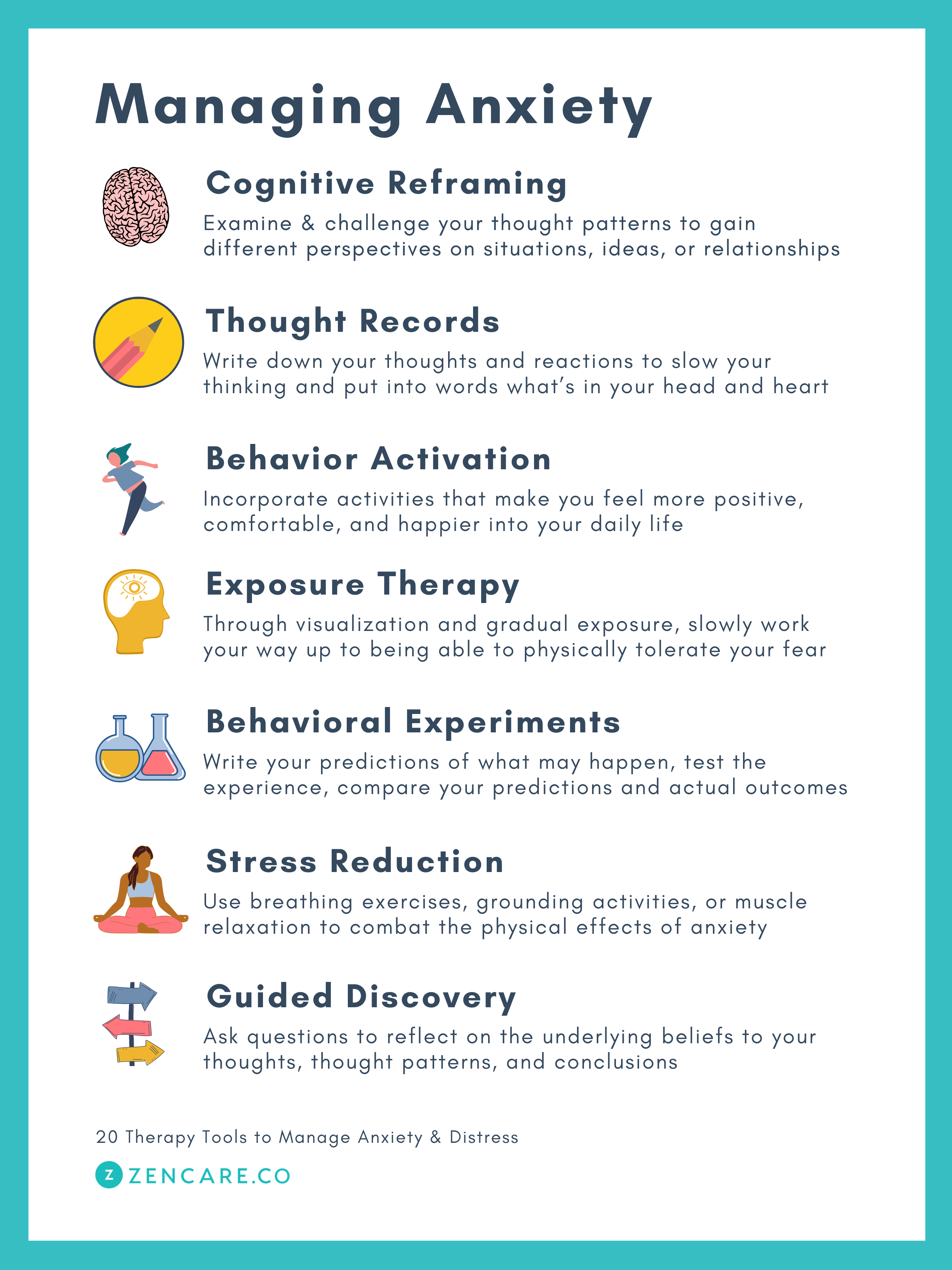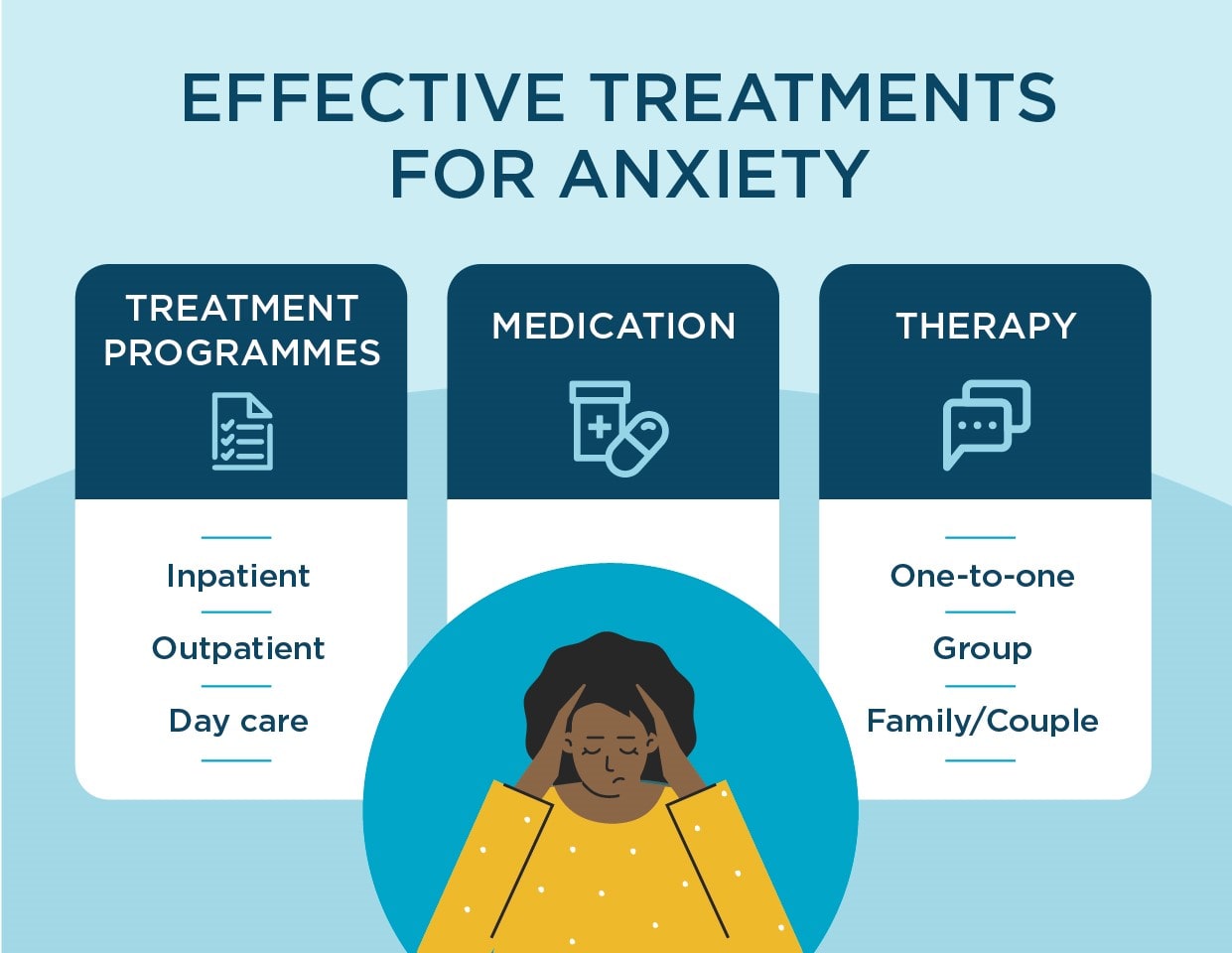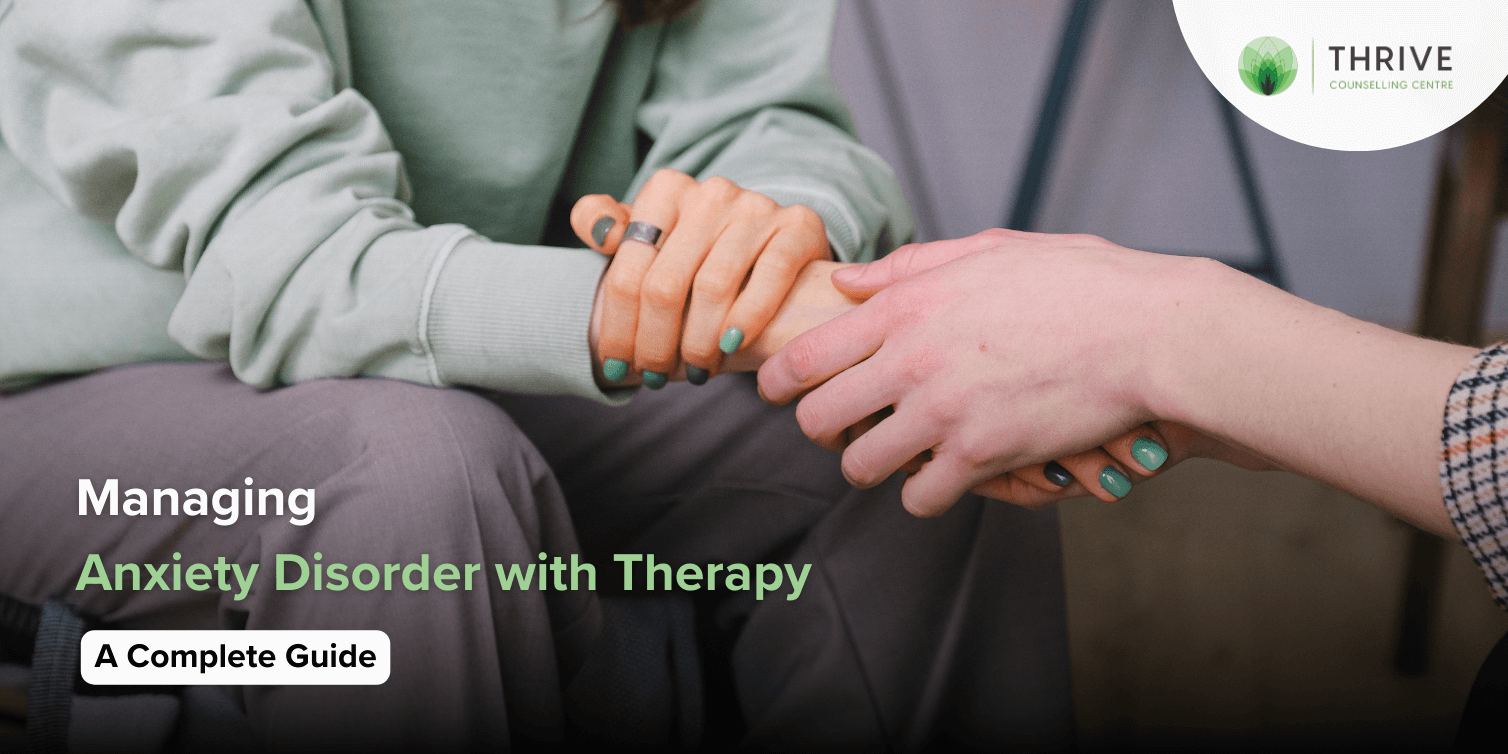Find peace and focus with reputable counseling services for anxiety
Find peace and focus with reputable counseling services for anxiety
Blog Article
Checking Out Different Approaches in Coaching for Anxiety Condition for Long-term Modification
When taking on anxiety problems, it's necessary to explore a range of therapy strategies. Each technique supplies unique understandings and tools to help you handle your signs effectively. You could discover that incorporating methods can yield the finest outcomes. However, understanding the subtleties of these techniques is key to fostering long-term change. What if the right mix could launch a new degree of emotional well-being for you?
Recognizing Stress And Anxiety Conditions: A Quick Review
Anxiousness disorders, which influence millions of people worldwide, can substantially affect day-to-day life. You could experience frustrating sensations of fear or worry that seem uncontrollable. These sensations can lead to physical signs and symptoms like a racing heart, sweating, or perhaps lightheadedness. Common kinds of anxiety problems consist of generalised anxiousness problem, panic attack, and social stress and anxiety problem. Each has one-of-a-kind indications, however they all share a propensity to interrupt your regular and relationships.Understanding the origin of your anxiety is important. It may stem from genetics, brain chemistry, or life experiences. Recognizing your triggers can help you manage your responses better. It's essential to bear in mind that you're not alone in this battle. Many individuals deal with similar obstacles, and looking for assistance is a solid action towards sensation better. By learning more about anxiety problems, you're currently on the path to understanding and managing your condition better.
Cognitive-Behavioral Treatment: Testing Adverse Idea Patterns
In Cognitive-Behavioral Therapy, you'll start by recognizing the negative thought causes that add to your stress and anxiety. You'll work on changing them with more favorable choices as soon as you recognize these thoughts. With each other, you'll develop efficient coping methods to help manage your anxiousness in everyday circumstances.
Determining Adverse Thought Triggers

Acknowledging the details triggers behind your adverse thoughts can be crucial in taking care of anxiousness when you experience moments of distress. Begin by taking notice of scenarios that provoke feelings of worry or fear. Is it a jampacked space, an approaching target date, or a discussion with particular people? Write these circumstances in a journal. This will aid you determine patterns in your reasoning. Additionally, notification physical experiences that accompany your adverse thoughts, like a racing heart or tightness in your breast. By pinpointing these triggers, you gain understanding into what's fueling your anxiety. Comprehending these links is the initial step in testing those thoughts and ultimately gaining back control over your emotional feedbacks.
Replacing Thoughts With Positives
Testing unfavorable thought patterns is a crucial step in transforming your attitude and lowering anxiety. You might frequently find yourself caught in cycles of insecurity or catastrophic thinking. Rather of allowing these thoughts dictate your feelings, practice replacing them with practical options or favorable affirmations. When you assume, "I can't handle this," change it to, "I can manage obstacles one action at a time." This straightforward change can considerably affect your emotion. Consistently recognizing and countering these adverse ideas aids produce a healthier inner dialogue. Bear in mind, it takes time and initiative, but consistently practicing this method can cause lasting change, encouraging you to face stress and anxiety with renewed self-confidence and strength.
Building Coping Strategies Together
Changing negative thoughts is only the beginning of taking care of stress and anxiety effectively. To create long lasting adjustment, you need to develop coping techniques that equip you. Cognitive-Behavioral Therapy (CBT) helps you recognize and challenge those unhelpful thought patterns. With each other, you and your therapist can check out how these thoughts effect your sensations and behaviors.Start by developing sensible techniques, like journaling or mindfulness workouts, that allow you to face anxiety head-on. When you encounter your worries slowly, you'll find out to respond in a different way.

Mindfulness and Acceptance-Based Approaches: Cultivating Present-Moment Awareness
As you navigate the complexities of stress and anxiety, integrating mindfulness and acceptance-based methods can substantially enhance your capacity to grow present-moment recognition. By focusing on the right here and now, you'll locate that you can observe your thoughts and feelings without judgment (Counseling services for anxiety). This technique helps you recognize your stress and anxiety without really feeling overwhelmed by it.Engaging in mindfulness exercises, such as deep breathing, body scans, or directed meditations, allows you to ground on your own in your existing experience. Acceptance-based techniques encourage you to embrace your emotions instead of combat versus them. When you accept your feelings, they shed their power over you.Incorporating these methods into your everyday routine can change exactly how you react to stress and anxiety. You'll establish durability and discover to navigate difficult situations with higher convenience. Inevitably, cultivating present-moment recognition lays the foundation for long lasting adjustment, encouraging you to lead an extra fulfilling life
Direct Exposure Therapy: Confronting Anxieties Slowly
Direct exposure therapy aids you challenge your fears in a progressive method, making it less frustrating. You'll learn techniques to face anxiety-provoking situations step by action, while also constructing coping approaches to manage your responses. This approach empowers you to take control and decrease stress and anxiety with time.
Progressive Exposure Techniques

When encountering stress and anxiety, progressively challenging your anxieties can be an effective method to reclaim control. This technique, called steady direct exposure, includes gradually exposing on your own to the scenarios or objects that cause your anxiety. Beginning with much less challenging situations and progressively function your method as much as even more challenging ones. As an example, if you hesitate of public talking, you could start by speaking in front of a mirror, then progress to sharing ideas with a good friend, and eventually attend to a small group. Each step helps desensitize you to the anxiety, building your self-confidence over time. Keep in mind, it's important to pace yourself and celebrate little success as you relocate with this procedure, enhancing your capability to manage anxiousness efficiently.
Structure Coping Methods
Building effective coping strategies is necessary for taking care of anxiety, specifically as you face your anxieties progressively - Counseling services for anxiety. One effective technique is direct exposure treatment, where you start by encountering your concerns in a controlled manner. Begin with much less daunting circumstances and slowly function your method approximately even more challenging situations. This steady exposure assists desensitize you to stress and anxiety sets off, making them less overwhelming.Incorporate relaxation methods, such as deep breathing or mindfulness, to soothe your mind throughout exposure. Track your progress, commemorating small triumphes in the process to improve your confidence. Bear in mind, it's all right to take your time; the objective isn't excellence however steady renovation. By developing these methods, you'll encourage yourself to navigate anxiousness and embrace life more totally
Psychodynamic Treatment: Revealing Origin Reasons of Anxiety
Psychodynamic therapy discovers the subconscious mind, exposing the origin of your anxiety. By analyzing your thoughts, feelings, and previous experiences, this strategy aids you reveal underlying conflicts and unresolved concerns that may add to your existing anxiousness. You'll work with a therapist to explore youth experiences, connections, and emotional patterns that form your feedbacks today.As you obtain insight into these deeper layers of your mind, you'll start to identify just how past occasions influence your existing habits. This understanding can cause catharsis, enabling you to refine emotions you might have suppressed.Through the healing partnership, you can additionally identify defense reaction that may have created over time, using a more clear course to transform. Ultimately, psychodynamic therapy outfits you with the tools to address your anxiousness at its core, advertising enduring transformation in your emotional wellness.
Integrative and All Natural Approaches: Combining Techniques for Greater Efficacy
Integrating numerous therapeutic methods can improve your trip toward handling anxiety more efficiently. By integrating aspects from cognitive-behavioral therapy, mindfulness methods, and all natural methods, you can produce a personalized technique that addresses your special demands. As an example, you could use cognitive-behavioral methods to challenge negative thought patterns while integrating mindfulness exercises to ground yourself in the present moment.Additionally, checking out holistic practices such as yoga or reflection can advertise relaxation and reduce anxiety symptoms. This mix allows you to develop higher self-awareness and resilience.Experimenting with these diverse approaches can assist you uncover what reverberates most with you. Keep in mind, it has to do with discovering a synergy that functions, instead of staying with a single strategy. This integrative strategy not just supplies instant relief but likewise cultivates lasting abilities for handling anxiety, encouraging you to redeem control over your life.
The Role of Support Systems: Building Resilience Via Connection
While it could seem that handling anxiousness is a solitary trip, having a solid support group can play an essential role in your durability. Bordering on your own with empathetic friends, family, or support teams produces a safe room where you can freely share your experiences and feelings. You advise on your own that you're not alone in this struggle.These relationships offer motivation and can supply functional coping strategies that have functioned for others when you link with others. It's also a chance to get point of view; close friends can assist you see circumstances in a different way, minimizing sensations of isolation.Moreover, psychological assistance cultivates a feeling of belonging, which can considerably relieve anxiousness symptoms. By leaning on your assistance system, you can build resilience and take on challenges extra properly. Remember, connecting for help signifies strength, and it can make all the distinction in your trip towards handling anxiousness.
Regularly Asked Inquiries
What Are the Common Signs of Anxiety Problems?
You could experience uneasyness, tiredness, problem focusing, irritability, muscle tension, and rest disruptions. Physical signs and symptoms can include fast heartbeat, sweating, and trembling. Recognizing these indicators early can help you seek suitable support and treatment.
Exactly How Lengthy Does Treatment Commonly Last for Anxiety Problems?
Therapy for anxiety disorders normally lasts anywhere check here from a few weeks to numerous months. It actually depends on your individual demands, progression, and the techniques your specialist utilizes to help you handle your anxiousness efficiently.
Can Medicine Be Used Alongside Treatment for Stress and anxiety?
Yes, medicine can definitely be used together with treatment for anxiety. Incorporating both techniques usually enhances therapy performance, assisting you take care of signs and symptoms while checking out underlying concerns via therapy (Counseling services for anxiety). Always consult your doctor for tailored recommendations
Are There Self-Help Approaches for Taking Care Of Anxiousness?
Yes, there are numerous self-help strategies for taking care of stress and anxiety. You can practice mindfulness, take part in normal exercise, maintain a balanced diet plan, establish a routine, and make use of deep breathing strategies to help reduce anxiety signs successfully.
How Do I Know if I Need Expert Aid for Anxiousness?

Report this page